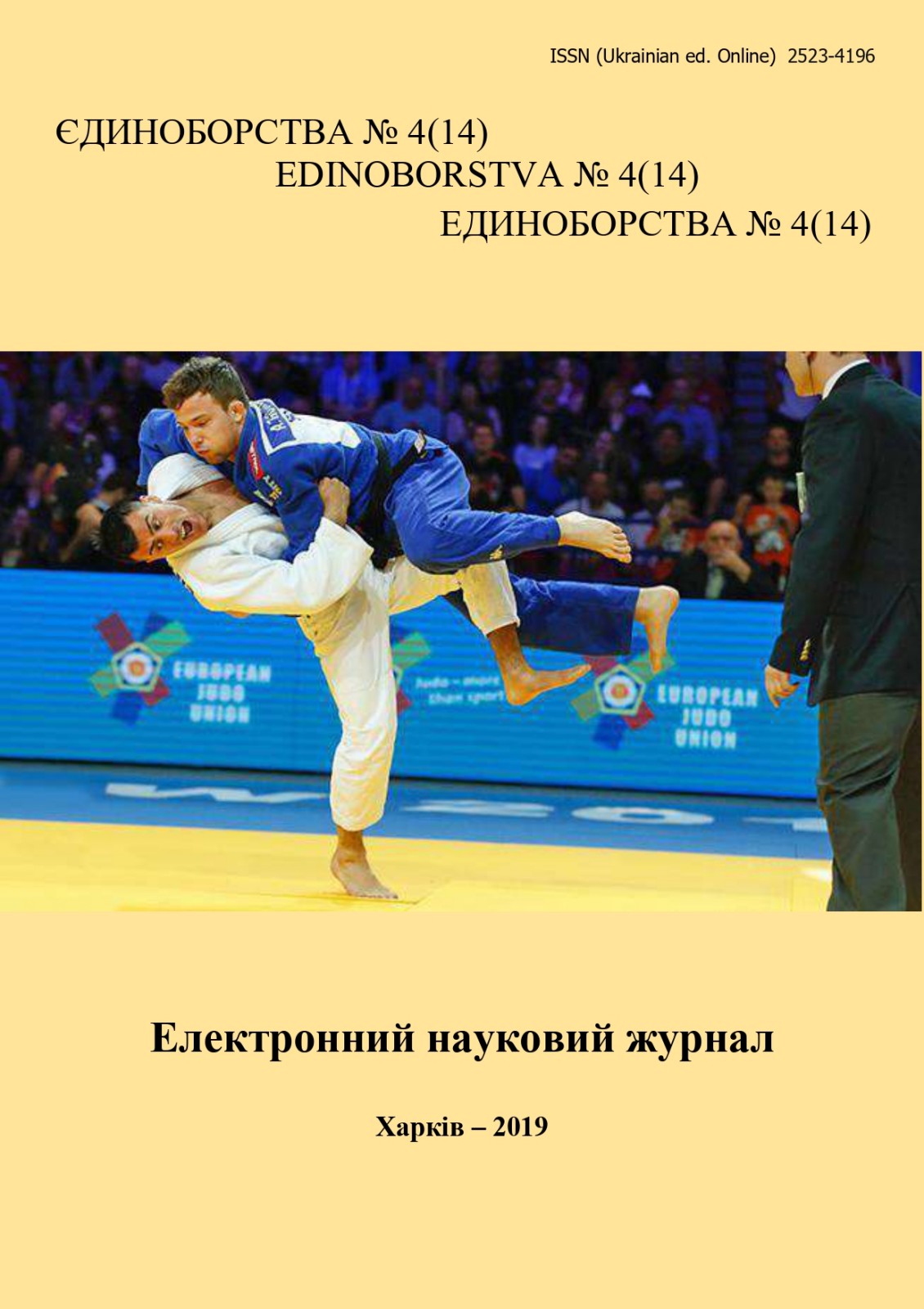Optimization of training process in karate through use of computer technologies
DOI:
https://doi.org/10.15391/ed.2019-4.05Keywords:
martial arts, karate, technique, computer program, psychology, motivation, algorithmAbstract
Purpose: to increase the efficiency of sports training in karate by introducing a special computer program «Pocket sensei» into the training process. Materials and methods: the study of special methodological literature on the specifics of training in karate allowed us to identify the main problematic issues that can be solved using a specialized computer program. Such issues include: methodological support of the training process in karate (text information, video), psychological tests, athletes database. The following methods were used in the study: theoretical analysis of scientific and methodological literature, instrumental method, psychological methods, questionnaires, computer programming methods. Results: looking for ways to increase the interest of the young generation in sports is one of the most important tasks that a trainer has to solve. Athlete's motivation is the most important factor determining his performance, professional growth and efficiency in both training and competitive activities. Skillful and considered use of computer technology in the training process can be just that motivating factor that will allow young athletes to be carried away by training sessions, increase their discipline and responsibility. At the first stage of the research, there was developed: a specialized computer program «Pocket sensei» and the author’s stress training technique «Komorebi». The computer program «Pocket sensei» is aimed at obtaining positive feedback between the trainer and the student. The coach has the ability to track the actions of the young spot-player in the program and better understand the spectrum of his interests, which will optimize the learning process in karate. The Komorebi stress training technique is based on the technique of confrontation with suppression of the anxiety reaction (exposure / response prevention) - the development of the technique of systematic desensitization, i.e. a technique for reducing negative tension, anxiety, and fears of annoying images, frightening objects, or situations. Conclusions: as a result of a theoretical analysis of the scientific and methodological literature, the effectiveness of using computer technologies in karate has been confirmed, which allows to bring the learning process to a higher professional level. The specialized computer program «Pocket sensei» and the author's stress training method «Komorebi» were developed. Implementation of these productions in study proccess will increase the efficiency of training karate.
References
Ашанин, В. С, & Романенко, В. В. (2015). «Использование компьютерных технологий при оценке сенсомоторных реакций в единоборствах». Слобожанский науково-спортивний сбірник, №4 (48), 15-18.
Ашанін, В. С., Єгорова, О. В., & Філенко, Л. В. (2018). Інформаційно-комунікаційні системи у фізичному виховані та спорті. Серія: Інформатика та інформаційні технології у фізичному виховані та спорті. [Навчальний посібник], ХДАФК, Харків.
Бабушкин, Г. Д., & Бабушкин, Е. Г. (2000). Формирование спортивной мотивации. Монография. Омск.
Барканова О. В. (2009). Методики диагностики эмоциональной сферы: психологический практикум. Серия: Библиотека актуальной психологии. Литера-принт, Красноярск.
Бойченко, Н. В., Алексеева, И. А., & Алексенко, Я. В. (2013). «Применение информационных технологий в спорте и восточных единоборствах». Проблемы и перспективы развития спортивных игр и единоборств в высших учебных заведениях, 56.
Бойченко, Н. В., Алексєнко, Я. В., & Алексєєва, І. А. (2015). «Інноваційні технології в системі підготовки спортсменів-єдиноборців». Єдиноборства, (11), 25-27.
Кузьмин, Е. Б., Денисенко, Ю. П., & Драндров, Г. Л. (2009). «Формирование спортивной мотивации как психолого-педагогическая проблема». Педагогико-психологические и медико-биологические проблемы физической культуры и спорта, (4 (13)), 87-94.
Маккелланд Д. (2007). Мотивация человека. Спб., Питер.
Ровный, А. С., Романенко, В. В., & Пятисоцкая, С. С. (2016). «Методика контроля и анализа изменений частоты сердечных сокращений единоборцев под воздействием физических нагрузок с использованием компьютерного приложения». Слобожанський науково-спортивний вiсник, 95-99.
Романенко, В. В., & Веретельникова, Н. А. (2017). «Биомеханический анализ техники в единоборствах». Единоборства No 4, 74-78.
Романенко, В. В., & Вовк, А. А. (2019). «Підвищення якості організації та проведення тренувального процесу з одноборцями-новачками завдяки використання спеціалізованої комп'ютерної програми для мобільних пристроїв». Единоборства No3,(13), 55-64.
Федоскина Е. М. (2010). «Методы психологической реабилитации спортсменов, находящихся в состоянии перенапряжения». VI Международ. науч. конф. психологов физической культуры и спорта, 153-155.
Хорни, К. (2016). Невротическая личность нашего времени. Philosophical arkiv, Nyköping (Sweden) - ISBN 978-91-983073-3-7.
Guay, R, Boggiano, А. К., & Vallerand, R. J (2001). «Autonomy support, motivation, and perceived competence: Conceptual and empirical linkages». Personality and Social Bulletin, 27, 643-650.
Jones, G., & Gary L. (2012). «Strauss, William and Neil Howe 'Generations: The History of America’s Future, 1584-2069' (Book Review)». Perspectives on Political Science 21, 218.
Weinberg, R.S., & Gould, D. (2007). Foundation for Sports & Exercise Psychology (Fourth edition). Human Kinetics.













